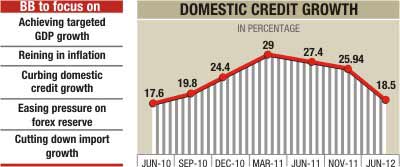BB to tighten monetary policy

Bangladesh Bank will announce its monetary policy today for the second half of the current fiscal year with a further tightening approach.
A high official of the central bank said the main target of the policy will be to achieve the targeted GDP (gross domestic product) growth and contain high inflation.
This time, the monetary policy will also reflect the recommendations of the International Monetary Fund (IMF) as Bangladesh is going to enter the credit programme of the donor agency after about a decade.
However, another BB official said the policy the central bank took at the beginning of the fiscal year will continue.
Non-food inflation crossed double digits in the recent years and outpaced food inflation for the first time in December.
The BB officials said one of the main targets of the central bank will be to contain non-food inflation.
Point-to-point inflation has been rising at a double-digit rate for a consecutive nine months since March last year.
Such a rare incident was last seen at the beginning of 1980s when inflation grew at a double-digit rate for a long time.
The central bank may also set a target to bring down domestic credit growth below 19 percent by June this year to rein in inflation.
In the first monetary policy of the current fiscal year announced in July the target was 20 percent.
The central bank officials said, to meet the target both public sector and private sector credit growth has to be brought down. However, cutting down public sector credit growth will be a big challenge, they said.
The target for private sector credit growth may be set at 13-15 percent by June next which was 18 percent in the first monetary policy.
The rate of private sector credit growth already came down to 19.33 percent in November 2011 from around 28 percent last fiscal year.
The BB has already taken several steps to contain credit growth. The moves include increasing repo rate and lifting the lending cap. The repo rate may be raised further by June.
To cut loan growth in the unproductive sector, consumers' and housing credit's equity portion of the total amount has been hiked by the central bank recently.
Another target of the monetary policy is to ease pressure on the foreign currency reserve and exchange rate by cutting down import growth.
On January 18 foreign currency reserve was $9.04 billion, down from $10.91 billion on June 30 last year.
The amount of the country's present reserve is equal to 2.87 months' import bill. But according to international standard, keeping the foreign currency reserve equal to a country's three months' import bill is considered as a safe limit.
An IMF report last month said a comprehensive package of macro-policy tightening measures and financial sector restraints is needed to stabilise the economy and avert a near-term balance of payments crisis.
The rapid loss of the central bank reserves over the past few months is expected to continue beyond fiscal 2012 and makes clear that the current policies are unsustainable, with a coordinated policy response essential to restoring macro-economic stability, the report said.
The Daily Star/Bangladesh/ 26th Jan 2012




Comments